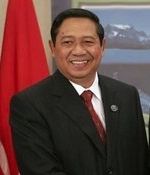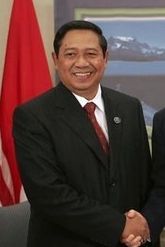User talk:Daeron/SBY

Susilo Bambang Yudhoyono (born September 9, 1949), Indonesian retired military general and stateman, is the sixth President of Indonesia, and the first to be elected directly by voters. Yudhoyono won the presidency in September 2004 in the second round of the Indonesian presidential election, in which he defeated incumbent President Megawati Sukarnoputri. He was sworn into office on 20 October 2004, together with Jusuf Kalla as Vice President.
(Javanese do not have surname in the Western sense. While Susilo Bambang uses Yudhoyono in naming his children, it is not a descended family surname. In Indonesia, he is referred to in some media as Susilo and is widely known in Indonesia as SBY. Abroad, he is referred to as Yudhoyono, a name that he chose for his military nametag, while in formal meetings and functions he is addressed as Dr Yudhoyono.)
Susilo is apparently derived from Sushil, which in Sanskrit means one with good character.
Education and military background
[edit]Yudhoyono was born in Pacitan, East Java, the son of Raden Soekotjo, an Army officer, and Siti Habibah. He graduated from the Indonesian Military Academy in 1973, and received the prestigious Adhi Makayasa Medal as the best graduate of the year. He married Kristiani Herawati, the third daughter of an army commander, General Sarwo Edhi Wibowo (Sarwo Edhie), who played a role in defeating the alleged coup d'état attempt by the Communist Party of Indonesia in 1965, and commanded the military operation to ensure 'success' of the 1969 Act of Free Choice in Irian Jay.
During his time as the commander of 305th Battalion 2nd Infantry Platoon in 1976, Yudhoyono was assigned to East Timor, and had several tours of duty there since. Like many other Indonesian officers involved in the occupation of East Timor, he has been accused of war crimes, but has never been charged with any specific act. He was once seen as a protege of the former Armed Forces chief, General Wiranto, who was then also a presidential candidate, but severed his relations with Wiranto when he decided to run for President.

Yudhoyono was regularly being assigned to study in the United States, starting from and trained at the 82nd Airborne Division and US Army Rangers at Fort Bragg in 1976 to US Army's Infantry Officer Advanced Course in 1982 and 1984 to US Command and General Staff College at Fort Leavenworth in 1991. He also gained an MA in business management from Webster University in 1991. He was Indonesia's Chief Military Observer of United Nation Peacekeeping Force in Bosnia in 1995-96. He later held territorial commands in Jakarta and in southern Sumatra.
He was appointed Chief of the Armed Forces Social and Political Affairs Staff in 1997, and was known in the media as "the thinking general" due to his popular ideas and concepts in reforming military and the nation. The position of Chief of Socio-Political Staff (Kassospol) was in November 1998 changed to Chief of Territorial Affairs (Kaster); one of two chiefs who commanded staff at TNI Headquarters and reported directly to the Commander of the Armed Forces (Pangab, Gen Wiranto). The other was the Chief of General Staff (Kasum, LtGen Sugiono). Both had East Timor responsibilities in 1999.
The Chief of Territorial Affairs technically coordinates all the territorial commands, including the Udayana command (held by MajGen Adam Damiri), and the East Timor command (Col Tono Suratman). Bambang Yudhoyono therefore shared command responsibility for the criminal conduct of TNI forces in East Timor in 1999. He had two assistants: one for territorial affairs (Aster), held in 1999 by MajGen Djoko Mulono, and one for socio-political affairs (Assospol, sometimes called Askomsos), held by MajGen Sudi Silalahi.
LtGen Sugiono and both of Bambang Yudhoyono's assistants, as well as a range of other military top brass, were present at a meeting in Jakarta on 19 February 1999 between General Wiranto and a large delegation of pro-integration East Timorese led by Domingos Soares. They had come to ask for weapons.[2]
On 21 June Yudhoyono and LtGen Sugiono received a visit from the vice chief of the Australian defence force, Air Marshal Doug Riding. Riding conveyed the message that 'the most significant threats to a genuinely free ballot come from the pro-integrationist militia groups, supported by TNI.... This is very seriously damaging the credibility of the Indonesian Government and TNI .... TNI must stop supporting the militias and must control their activities.' However, Yudhoyono dismissed the thrust of Riding's case. Disturbance to that point, he said, had been minor.[3] Yudhoyono oversaw the fake militia disarming in late September 2000 where Eurico Guterres and others retrieved automatic weapons and went free.
Bambang Yudhoyono is often portrayed as an intellectual and a reformer. But he is also a nationalist, who felt offended by foreign pressure on Indonesia's human rights policy in East Timor and elsewhere.[4] After the withdrawal from East Timor he defended the TNI against allegations that it had committed crimes against humanity by presenting what had happened in East Timor as far less serious than Rwanda, Bosnia or the Nazis in World War II. 'There is a conspiracy, an international movement... to corner Indonesia by taking up the issue', he said.[5]
Bambang Yudhoyono was appointed Mines Minister in the new Abdurrahman Wahid cabinet (October 1999); he retired from active service on April 1, 2000, due to his appointment as a minister. He received his PhD in agricultural economics from the Bogor Institute of Agriculture on 3 October 2004, two days before his presidential victory was announced. His dissertation is entitled "The Rural and Agricultural Development as an Effort to Alleviate Poverty and Unemployment: a political economic analysis of fiscal policy".
Political background
[edit]Yudhoyono was appointed Mines and Energy Minister in the government of President Abdurrahman Wahid in 2000. He was soon promoted to the key position of Minister for Security and Political Affairs. One of his tasks was to get the army out of politics. This is in line with his reformist ideas on the future of Indonesian military, and is a view he has held since his days in an army policy center. "Since 1998, the military has decided to stay out of day-to-day politics," he said at that time. "The basic idea of military reform is to go back to the role and function of the military as a defense force and move them away from politics systematically. The trend is moving in such a way that there is no so-called 'dual function' of the military, there is no so-called social political mission in the military."
Given Wahid's physical (and, it was said, mental) incapacity, Yudhoyono was seen as the dominant figure in the Wahid government. In 2001 Wahid, who was facing impeachment, asked Yudhoyono to declare a state of emergency to shore up his position against the Parliament. Yudhoyono refused to accept this, and Wahid dismissed him. This gave him a new reputation for liberalism.
Yudhoyono was almost immediately re-appointed to his post by the new President, Megawati Sukarnoputri. After the October 2002 Bali bombing, he oversaw the hunt for and arrest of those responsible, and gained a reputation both in Indonesia and abroad as one of the few Indonesian politicians serious about the War on Terrorism. His speech during the one year anniversary of the Bali's attack (in which many Australians were killed) was praised by the Australian media and public. In March 2004 he resigned, reportedly after a falling-out with Megawati and her husband. The timing of his resignation was widely seen as linked to his decision to run for president.
Unlike most other presidential candidates, Yudhoyono put forward broad policies for the future of Indonesia. His manifesto, summarised in a book titled "Vision For Change" written by him and distributed for free during the campaign, was built on four pillars: prosperity, peace, justice and democracy. At the top of his agenda was a plan for increasing economic prosperity, aiming for economic growth of at least 7% and a revival of small and medium-sized enterprises. He also put forward policies to offer better credit lines, to cut red tape, improve labor laws and to root out corruption from the top down. He told an interviewer: "If we are to reduce poverty, create jobs, increase purchasing power and rebuild infrastructure, then we will need new capital. Of course, to be able to invite investment, I have to improve the climate — legal certainties, political stability, law and order, sound tax policies, customs policies, good labor management. I will improve the guarantees to encourage investors to come to Indonesia."
Yudhoyono's reputation for integrity, strong personality appeal, and excellent communication skills made him the front-runner throughout the election campaign, according to all opinion polls and the opinions of election commentators, a long way ahead of Megawati Sukarnoputri, Wiranto and the other two candidates, Amien Rais and Hamzah Haz. He, together with his newly-formed Democratic Party, became the front-runner by picking up much of the support base that gained Megawati's party the largest share of the vote at the 2000 legislative elections. He won the second round of the elections with 60.87% of the popular vote defeating incumbent President Megawati.
Family
[edit]Yudhoyono lives both in the Presidential Merdeka Palace in Jakarta and his family residence in Bogor with his wife, Kristiani Herawati Yudhoyono. His elder son, Agus Harimurti Yudhoyono (born 1979), graduated from the reputable Taruna Nusantara High School in 1997 and Indonesian Military Academy in 2000 and is a holder of the Adhi Makayasa Medal like his father. He is now an Army officer, assigned to an infantry division in Bandung, West Java and is married to Anissa Pohan, an actress and also the daughter of an ex-Bank Indonesia vice-president since the 9th of July 2005. Starting from mid-2005, Agus is currently pursuing his master degree in Strategic Studies at Institute of Defense and Strategic Studies, Singapore. Yudhoyono's younger son, Edhie Baskoro Yudhoyono (born 1982) received a commerce degree in 2005 from the Curtin University of Technology, in Perth, Western Australia.
External links
[edit]
| Presidents of Indonesia | ||
| Preceded by: Megawati Soekarnoputri (2001 – 2004) |
Susilo Bambang Yudhoyono (2004 –) |
Followed by: - |
| Politics of Indonesia | ||
